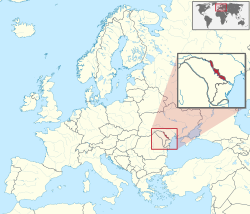Transnistria
|
Pridnestrovian Moldavian Republic |
|||||
|---|---|---|---|---|---|
|
|||||
|
Anthem:
Мы славим тебя, Приднестровье (Russian) My slavim tebya, Pridnestrovye (transliteration) We sing the praises of Transnistria |
|||||
 |
|||||
| Capital and largest city |
Tiraspol | ||||
| Official languages | |||||
| Inter-ethnic language |
script: Cyrillic (Moldovan alphabet), Russian | ||||
| Ethnic groups (2005) |
|
||||
| Demonym | Transnistrian, Pridnestrovian | ||||
| Government | Unitary semi-presidential republic | ||||
| Vadim Krasnoselsky | |||||
| Aleksandr Martynov | |||||
| Legislature | Supreme Council | ||||
| Partially recognised state | |||||
| 2 September 1990 | |||||
| 2 March – 21 July 1992 | |||||
|
• Recognition
|
3 non-UN membersc | ||||
| Area | |||||
|
• Total
|
4,163 km2 (1,607 sq mi) | ||||
|
• Water (%)
|
2.35 | ||||
| Population | |||||
|
• 2014 estimate
|
505,153 | ||||
|
• 2015 census
|
475,665 | ||||
|
• Density
|
124.6/km2 (322.7/sq mi) | ||||
| Currency | Transnistrian rubled (PRB) | ||||
| Time zone | EET (UTC+2) | ||||
|
• Summer (DST)
|
EEST (UTC+3) | ||||
| Calling code | +373e | ||||
| Internet TLD | nonef | ||||
|
|||||
Transnistria (Moldovan: [transˈnistria]), officially the Pridnestrovian Moldavian Republic (PMR; Russian: Приднестровская Молдавская Республика; Moldovan: Република Молдовеняскэ Нистрянэ; Ukrainian: Придністровська Молдавська Республіка); also called Transdniester, Trans-Dniestr, Transdniestria, or Pridnestrovie, is a self-proclaimed republic on a strip of land between the River Dniester and the border with Ukraine, recognised only by three non-United Nations (UN) states. The region is considered by the UN to be part of Moldova. The PMR controls most of the territory to the east of the River Dniester, and also the city of Bender and its surrounding localities on the west bank, in the historical region of Bessarabia.
Unrecognised by any United Nations member state, Transnistria is designated by the Republic of Moldova as the Transnistria autonomous territorial unit with special legal status (Romanian: Unitatea teritorială autonomă cu statut juridic special Transnistria), or Stînga Nistrului ("Left Bank of the Dniester").
After the dissolution of the USSR, tensions between Moldova and the breakaway Transnistrian territory escalated into a military conflict that started in March 1992 and was concluded by a ceasefire in July of the same year. As part of that agreement, a three-party (Russia, Moldova, Transnistria) Joint Control Commission supervises the security arrangements in the demilitarised zone, comprising twenty localities on both sides of the river. Although the ceasefire has held, the territory's political status remains unresolved: Transnistria is an unrecognised but de facto independentpresidential republic with its own government, parliament, military, police, postal system, currency and license plates. Its authorities have adopted a constitution, flag, national anthem, and coat of arms. It is the only country with a hammer and sickle on its flag.
...
Wikipedia


